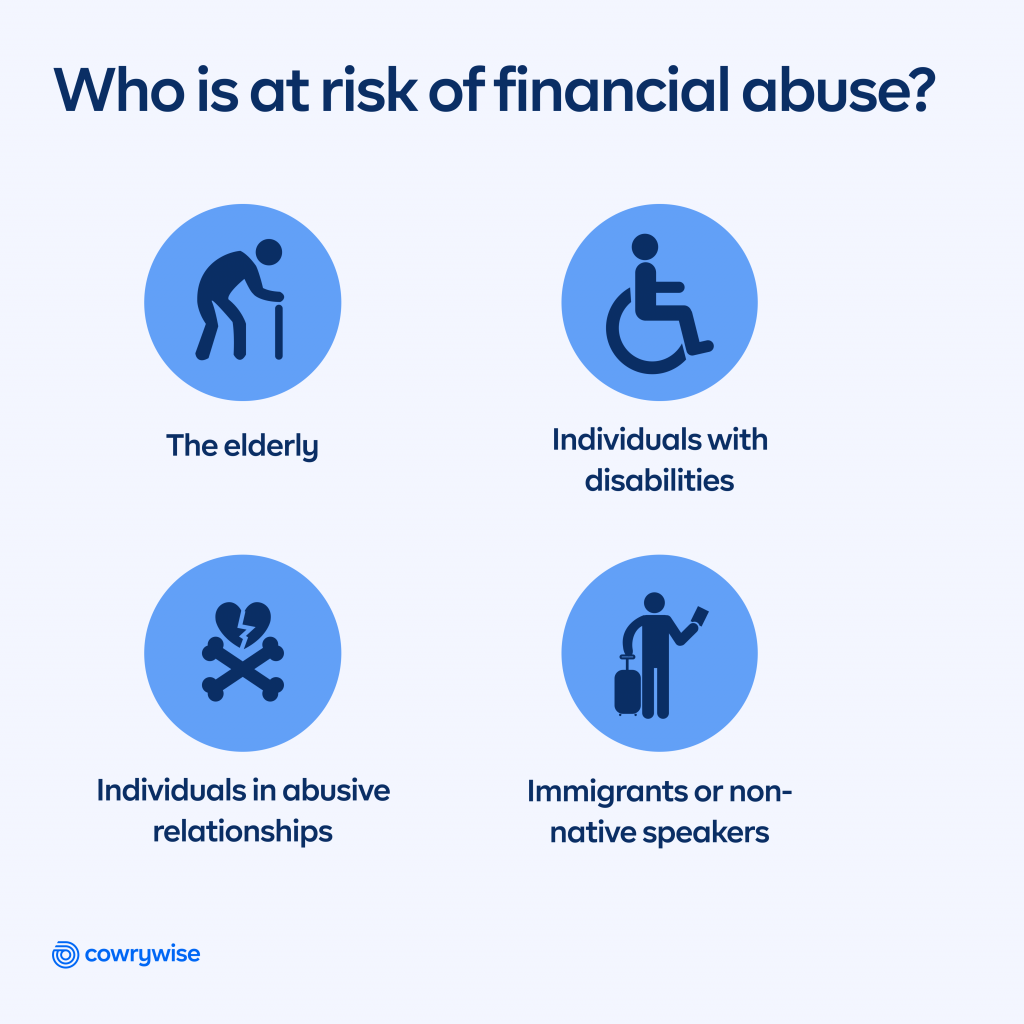
What is Financial Abuse?
Financial abuse is a form of domestic violence or elder abuse that involves the misuse or withholding of financial resources or assets by one person in a relationship to control or exploit the other.
Jump to a section:
- Statistics on financial abuse
- Types of financial abuse
- Signs of financial abuse
- Who may be at risk of financial abuse
- How to protect yourself
- Conclusion
Introduction: Statistics on Financial abuse
According to The 2011 MetLife Study of Elder Financial Abuse, financial abuse of older adults is a growing problem, with an estimated $2.9 billion lost annually to financial exploitation.
The National Network to End Domestic Violence reports that financial abuse is present in 99% of domestic violence cases. A survey conducted by the Allianz Life Insurance Company found that 37% of active caregivers said the elder they care for has experienced financial abuse or exploitation with a loss.
The National Adult Protective Services Association reported that financial exploitation is the most common form of elder abuse, comprising nearly 60% of all reported cases. According to a report by the New York Post, nearly 70% of millennial women have experienced financial abuse by a romantic partner.
These statistics highlight the widespread nature of financial abuse and the need for greater awareness and prevention efforts.
Financial abuse can take many forms, including controlling finances, exploitation, etc. It can happen to anyone, irrespective of age, gender, or socioeconomic status. Recognizing the signs of financial abuse is crucial to protect oneself and seeking support from relevant professionals or agencies.
This article will provide an overview of the different types of financial abuse, the signs to look out for, and who may be at risk. Additionally, the article will outline practical steps individuals can take to protect themselves.
Types of financial abuse
Financial abuse can take many different forms, but several common types are often seen in abusive relationships. These include:
- Controlling finances: Controlling finances is a common tactic used by abusers to maintain power and control over their victims. This may involve withholding money, preventing the victim from accessing funds, or forcing the victim to account for every penny they spend. The abuser may also use financial leverage to coerce the victim into doing things they don’t want to do, such as staying in an abusive relationship.
- Exploitation: Exploitation may include stealing money or valuables, forging the victim’s signature on documents, or taking out loans in the victim’s name without their knowledge or consent.
- Sabotage: Sabotage involves intentionally damaging the victim’s financial stability or reputation. This may include destroying important financial documents, or preventing the victim from maintaining employment or other sources of income.
- Identity theft: Identity theft involves stealing the victim’s personal information for financial gain.
Signs of financial abuse
Financial abuse can be difficult to recognize, as it often occurs alongside other forms of abuse such as physical or emotional abuse. However, here are some signs that may indicate someone is experiencing financial abuse.
- Being denied access to money: If someone is being denied access to their own money, or if their partner is controlling all of the finances, it could be a sign of financial abuse. This can include not being able to access bank accounts, credit cards, or other financial resources.
- Being forced to account for every penny spent: This can include having to justify every purchase or being criticized for spending money on necessities.
- Having your signature forged on financial documents: If you discover that your signature has been forged on financial documents, this is a sign of financial abuse. This can include loans or other financial documents that you did not authorize.
- Not being allowed to work or access education: This can include being prevented from obtaining a job or furthering your education, or being forced to quit your job or drop out of school.
- Being coerced into signing financial documents: If someone is coerced into signing financial documents, it could be a sign of financial abuse. This can include signing over power of attorney, taking out a loan, or signing a contract without fully understanding the implications.
- Having your credit score ruined: This can involve having accounts opened in your name without your knowledge or consent or having your credit cards maxed out without your consent.
Generally, financial abuse can have a devastating impact on the victim’s financial security, emotional well-being, and overall quality of life.

Who may be at risk of financial abuse?
Anyone can be at risk for financial abuse, but certain people may be more vulnerable:
- The elderly: Elderly individuals are at a higher risk due to factors such as cognitive decline, isolation, and dependency on caregivers. Family members or caregivers may take advantage of the elderly person’s trust to gain access to their finances.
- Individuals with disabilities: Caregivers, for instance, may take advantage of their position of trust to exploit the individual’s finances.
- Individuals in abusive relationships: Abusers may use control of finances as a means of maintaining power and control over their partners.
- Immigrants or non-native speakers: This group of people may be at risk due to language barriers and a lack of knowledge about the financial system in their new country. They may also be hesitant to seek help or report abuse due to fear of deportation or other consequences.
How to protect yourself from financial abuse
If you or someone you know is experiencing financial abuse, take these steps:
- Seek support: This can include reaching out to friends or family members, contacting a domestic violence hotline, or speaking with a financial advisor.
- Create a safety plan: This involves opening a separate bank account, setting up automatic bill payments, and keeping important financial documents in a safe place.
- Monitor financial accounts: This helps to identify any unauthorized transactions or suspicious activity. Review bank statements, credit reports, and other financial documents regularly.
- Be cautious with personal information: Do not share personal information with individuals or organizations unless absolutely necessary.
- Seek legal assistance: If the financial abuse involves illegal activity such as identity theft, it may be necessary to seek legal assistance such as contacting a lawyer or filing a police report.
- Educate yourself: Stay informed about financial scams and be cautious when receiving unsolicited offers or requests for personal information.
Conclusion
Financial abuse is a serious problem that affects individuals of all ages and backgrounds. It can have devastating consequences, including loss of financial security, and emotional trauma.
By seeking support, creating a safety plan, monitoring financial accounts, being cautious with personal information, seeking legal assistance if necessary, and educating themselves about financial abuse, individuals can take proactive steps to safeguard their financial well-being.
Financial abuse is often intertwined with other forms of abuse, including domestic violence and elder abuse. It is important to address it as part of a larger effort to combat these forms of abuse and promote safety and security for all individuals.
RELATED
Financial Inclusion in Nigeria
Survey on Personal Finance in Nigeria
Behavioural Finance in Action: How Emotions Affect Your Investment Decisions

This was well written. I’d love to see this from the perspective of women; as I believe many of them face this.